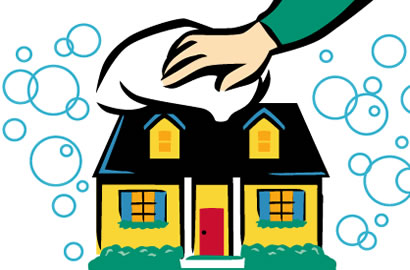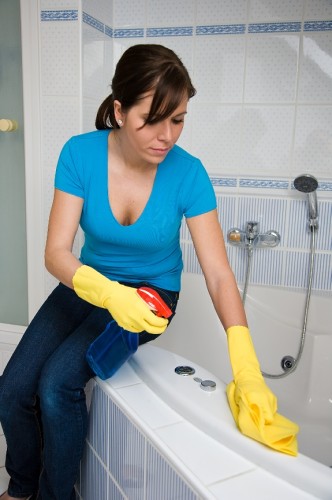Clean Tips for Your Home the Natural Way
 It’s an unfortunate, and in many ways disturbing, fact that most commercial home cleaning supplies are toxic to humans. We clean the areas we most use with harsh chemicals that could kill us. Does that seem ridiculous to anyone else?
It’s an unfortunate, and in many ways disturbing, fact that most commercial home cleaning supplies are toxic to humans. We clean the areas we most use with harsh chemicals that could kill us. Does that seem ridiculous to anyone else?
Fortunately, we don’t have to use harsh chemicals to clean our homes. We can avoid ammonia- or chorine-based cleaners, which have been linked to headaches, respiratory distress, and other health issues.
Natural cleansers like baking soda and vinegar will help you keep your home clean and inviting, not to mention that natural cleansers are cheaper than harsh commercial cleansers.
Take a look at how to bring natural cleansers to bear throughout your home:
For the Kitchen
Kitchens take a great deal of abuse during years of food preparation and more than the occasionally spill or stovetop overflow. If left untreated, or inadequately treated, your kitchen could become a breeding ground for illness-causing bacteria.
Using a mixture of 2 cups water, 3 tablespoons liquid dish soap, and a couple teaspoons of tea tree oil, disinfect your countertops (and other surfaces).
If cheesy foods bubble over in the oven, cover the overflow with salt, go on to enjoy your meal, and watch how easily the cheesy mess comes off when you’re ready to come back to it (about 45 minutes is ideal for larger areas). For periodic, serious oven cleaning bouts, wet down the surfaces using a sponge and water. Then, mix a paste using ¾ cup baking soda, ¼ cup salt, and ¼ cup water; line the interior with the paste. (Don’t use on exposed metal.) Let it sit overnight. In the morning, the paste will have caked over. Use a spatula to remove it. Any problem areas can be taken out with steel wool.
 If you have stained counters, apply a baking soda and water paste. Let sit for 30 minutes to an hour before abrading them with a damp cloth.
If you have stained counters, apply a baking soda and water paste. Let sit for 30 minutes to an hour before abrading them with a damp cloth.
For stovetop spills, try a salt bath. Cover nasty caked on grease and the like with salt, wait an hour, and then scour them with a wet cloth or sponge.
Need to polish some silverware? Mix 3 parts baking soda to 1 part water. Work the mixture over the silverware using a soft cloth. Remove the residue with warm water and then dry them.
For the Bathroom
We all want a clean bathroom. Luckily, there are plenty of simple fixes for a dirtyone.
Fill a spray bottle halfway with vinegar. Fill it the rest of the way with water. Cap it off, shake it a bit to mix it up, and then spray this all-purpose cleaner, which gets rid of soap scum and hard water stains on your fixtures and in and around your sinks. You can even use it to spray down your toilet seats.
You can even mop your floor with the same vinegar/water solution; just mix up a larger portion in your mop bucket.
When it comes to toilet bowls, baking soda will be your base. Sprinkle baking soda around the inside rim. Let it sit for 5-10 minutes. Then, spritz it down with your vinegar/water (miracle?) solution. Finally, clean the toilet bowl with your toilet brush.
 Another natural compound you should know about is copper sulfate. It’s not a cleanser, per se, but it does repel roots from your pipes. In other words, it prevents you from having to clean up after burst sewer pipes and pay the costs associated with drainage repair. Twice each year, flush two pounds of copper sulfate down your toilet—half a cup at a time. With the last half-cup, allow it to sit in the bowl overnight.
Another natural compound you should know about is copper sulfate. It’s not a cleanser, per se, but it does repel roots from your pipes. In other words, it prevents you from having to clean up after burst sewer pipes and pay the costs associated with drainage repair. Twice each year, flush two pounds of copper sulfate down your toilet—half a cup at a time. With the last half-cup, allow it to sit in the bowl overnight.
Worried about mildew and shower stains? How about soap scum on porcelain or tile? Once again, your vinegar/water solution can take care of that for you. Spray it on, wait a few minutes, and wipe yourfears away.
For the Living Room (& other Spots)
No matter what I do, it seems like I’m always tracking mud, or at least dirt, into the house. And while it’s a fairly simple task to take a rug outside and beat dust out of it, it’s good to have some heavy-duty—but natural—remedies for larger stains.
If you’ve literally just spilled something, your best bet is to use cornmeal. Simply pick up any solids, cover the rest with cornmeal, wait about 10 minutes, and then vacuum up your troubles.
For older, set-in stains, mix 1/3 cup water with ¼ cup liquid soap. (You may need to use a blender to dissolve the solution properly.) It’ll go foamy, and then you know it’s ready. Spray that on, then pour on a bit of vinegar.
For less-than-pleasant odors, you can use the same baking soda you use in your refrigerator by just sprinkling some over your carpet (and then vacuuming it up a half-hour later), or you can turn to vinegar with lemon juice. Simply take a few small dishes, pour in some vinegar, add lemon juice, and strategically set them around your home. As a bonus, setting them next to candles makes for a pleasant look and an enhanced scent experience.
When you clean your windows, use a solution of white vinegar and water. Unlike your all-purpose cleaner, this one takes just 2 tablespoons of white vinegar to a gallon of water. (If the smell is too pungent for you, add in some lemon juice.)
For wooden surfaces, both cabinets and floors alike, take a lemon/vinegar solution and add olive oil (to really bring out the shine). With cabinets, desks, and the like, gently rub it in with a damp cloth; for floors, you can mop at your normal vigorous pace.
If you need fabric softener, try adding half a cup of vinegar to your rinse cycle. Vinegar is exceptional when it comes to breaking down laundry detergent.
Now you’re ready to clean your whole home with natural products!
What are some of your favorite natural cleaning solutions?
Author Bio: Chris Miller is a professional writer, blogger, and English grammar enthusiast. Chris enjoys learning about new health products, procedures, and ideas.
Sanju kmr
Latest posts by Sanju kmr (see all)
- Stay Ahead with Reliable Roofing Maintenance Services - February 27, 2025
- Maximizing Energy Efficiency: The Role of an HVAC Home Auditor - February 25, 2025
- Summer Sale 2025: How to Snag the Best Mattress Deals - February 21, 2025
